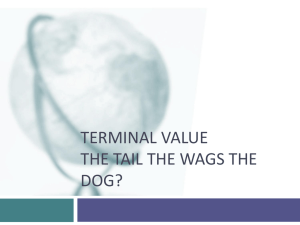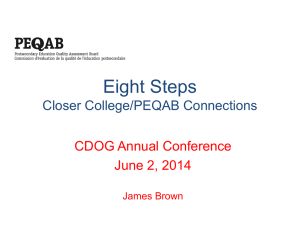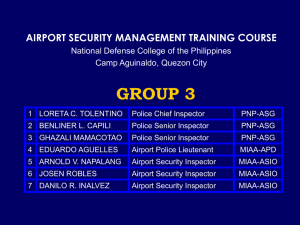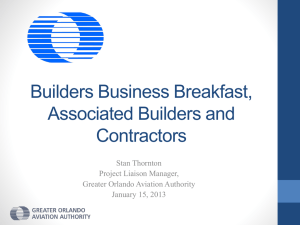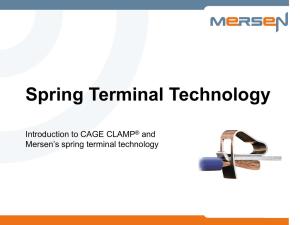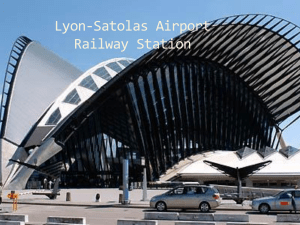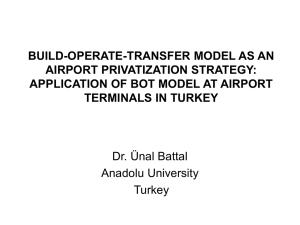to view a power point presentation
advertisement
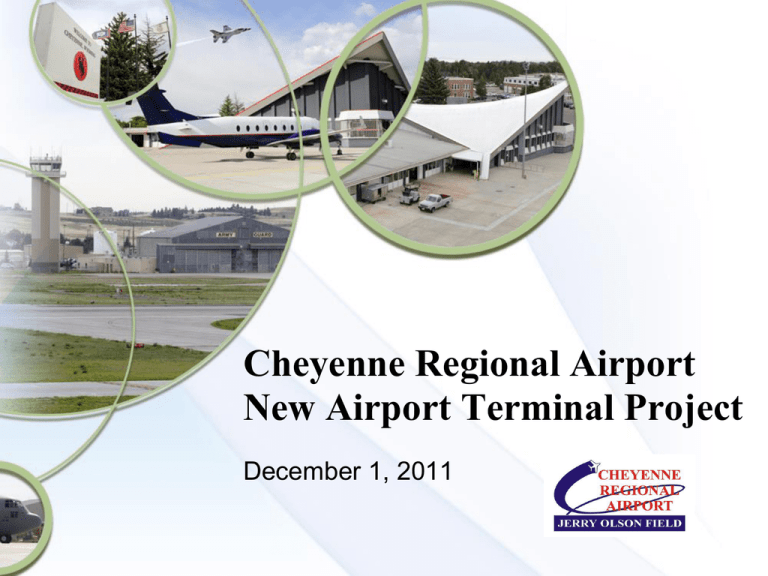
Cheyenne Regional Airport New Airport Terminal Project December 1, 2011 Discussion Items • Airport Information • Existing Terminal • Feasibility Study • 20% Schematic Design • 20% Terminal Cost Estimates • Funding Scenarios • Final Thoughts Airport Information • Founded September 8, 1920 • Two terminals – 200 E. 8th Avenue (1930-1961) – 300 E. 8th Avenue (1961-Present) • Two Air Carriers serve Cheyenne – Great Lakes Airlines (6 flights/ day to Denver) – American Eagle (1 flight/day to Dallas) • In 2010, over 42,000 people flew into or out of the Cheyenne Regional Airport • As of September 2011, total passenger use was up over 46% from 2010. Existing Terminal • Built in 1961 (50 years old) – Drastically different operating environment • Beyond serviceable life-span – Surpassed useful life years ago, but demand shifted • Numerous deficiencies: – Parabolic Design – not suitable for remodel – Structural failures – Outdated MEP systems – Inadequate parking – Inadequate hold rooms – Inadequate security – Inefficient split-level layout Feasibility Study Summary of Process – Initial Study • Aug. 2007 – Met with Board to discuss study goals » » » » Existing terminal evaluation Review capacity and forecast demand Solicit input from stakeholders, users and agencies Assess terminal alternatives at current airport (not evaluate new airport) » Develop conceptual terminal diagram/solution • Sep. - Oct. 2007 – Stakeholders, initial site analysis, forecast & program • Nov. 2007 – Site cost assessment • Dec. - Jan. 2008 – Non-site specific conceptual terminal diagram • Mar. 2008 – Study summary complete Feasibility Study (Continued) Public Involvement Process • Jan. 2009 – Tenant and agency update and feedback • Feb. 2009 – Public update and feedback • Mar. 2009 – Revisions, public update • April - May 2009 – Additional revisions, public updates (if necessary) – Final site selection Conclusion of General Assessment • Wide range of physical deficiencies fail to meet operational needs of the Airport • Existing site will not meet operational demands of an expanding terminal • Future growth cannot be accommodated using site as configured Feasibility Study (Continued) Site Alternatives Not viable due to excessive grade change, infrastructure req.s (new taxiway on fill, etc.) also outside ALP, runway envelope conflicts Not viable due to insufficient depth and excessive grade change. 4. 1. 5. Viable Directed to look at preliminary costs. Site is constricted. 3. Viable Directed to look at preliminary costs. 2 . Not viable due to insufficient depth and proximity to residential areas. 20% Schematic Design • $1,500,000.00 for design was approved on previous 6 Penny Ballot • September 2010 – February 2011 • Addressed operational needs of airlines – 30,000 annual enplanements • Passenger service improvements – Gate hold seating, ticketing, security, concessions, and restaurants • Pre-security waiting areas • Viewing platforms 20% Schematic Design • Efficient security check points • MEP upgrades incorporating many “green” concepts • Multi-story layout • Additional concession space • Ample, multi faceted parking • New terminal apron – can accommodate longer aircraft 20% Terminal Cost Estimates Terminal (+/- 35,000 sq. ft.) Terminal Apron Room for 4 mid-sized aircraft Terminal Parking Over 400 spaces in 2 lots Total $10,500,000.00 $3,200,000.00 $3,800,000.00 $17,500,000.00 Funding Scenarios • From FAA – Airport Improvement Program Entitlement Dollars $3,000,000.00 Discretionary Dollars $2,000,000.00 Sub Total $5,000,000.00 • From WYDOT Aeronautics Sub Total $2,500,000.00 • From 6 Penny Sub Total FAA $5,000,000.00 *Approximately 28% of total project cost • Airport Bonding/Other Funding Sub Total Total Funding $5,000,000.00 $17,500,000.00 WYDOT 6 Penny Airport Bonding/Other Funding Final Thoughts • Construction of a new terminal facility is the most flexible and cost effective means of insuring the long term sustainability of passenger service at the Cheyenne Regional Airport • It is important not to think of the terminal facility as simply a building. The terminal is the most visible part of a gateway to Cheyenne that serves as both the first and last impression to visitors and residents alike
